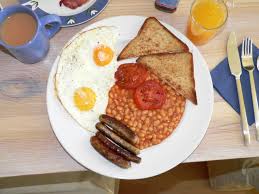
The oat producer Flahavan's postulates this lack of food can leave you tired, moody, and lower the quality of your work. The word breakfast literally refers to breaking the fasting period of the prior night. It's origin comes from the Christian custom of fasting from food between the supper meal of one day and receiving Holy Communion the following morning.
Two in three people eat breakfast every day, but the study found one in 13 dispensed with a morning meal.
Of those who regularly abstain, two-thirds said they found it difficult to eat early in the morning. Other reasons include not considering breakfast important, not having time, preferring to stay in bed and having too many chores.
The results also pointed to more people missing the first meal of the day than they did three years ago.
While cold cereals, porridge, fruit and toast remain the staple morning fuel for the majority of UK breakfasters, the traditional fry up has now become an occasional treat. Source: Daily Mail.
So what do small people, who need it the most, eat in the morning in other parts of the world?
'Breakfast for a child in Burkina Faso, for example, might well include millet-seed porridge; in Japan, rice and a putrid soybean goop known as natto; in Jamaica, a mush of plantains or peanuts or cornmeal; in New Zealand, toast covered with Vegemite, a salty paste made of brewer’s yeast; and in China, jook, a rice gruel topped with pickled tofu, strings of dried meat or egg. In Cuba, Brazil and elsewhere in Latin America, it is not uncommon to find very young children sipping coffee with milk in the mornings. In Pakistan, kids often take their milk with Rooh Afza, a bright red syrup made from fruits, flowers and herbs. Swedish filmjolk is one of dozens of iterations of soured milk found on breakfast tables across Europe, Asia, the Middle East and Africa. For a child in southern India, the day might start with a steamed cake made from fermented lentils and rice called idli. “The idea that children should have bland, sweet food is a very industrial presumption,” says Krishnendu Ray, a professor of food studies at New York University who grew up in India. “In many parts of the world, breakfast is tepid, sour, fermented and savory.” '
Source: NY Times.

Those of you who work will need more fuel depending on the amount of physical activity you engage in.
I remember the days of eight hours hard physical work as a kitchen assistant. Always on the move, waiting tables, taking orders, washing dishes, and preparing food. On top of that, I walked to work and home again at the end of each day. During that time, I only ate cereal first thing, but topped my food needs up with a second breakfast at the first break. Consequently, hunger never affected the quality of my work. And no—I wasn't tired, grumpy or moody.
What do you eat for breakfast?





 RSS Feed
RSS Feed
